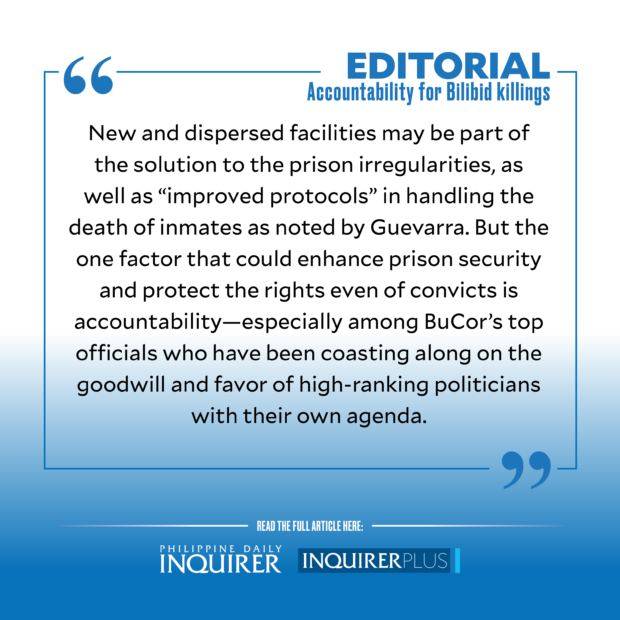
The NBI said it has evidence to back the murder charges against the officers—a police major, two sergeants, 15 corporals, three patrolmen, and a police doctor with the rank of lieutenant colonel—who had last custody of the inmates, most of the high-profile drug convicts confined at the New Bilibid Prison (NBP) in Muntinlupa.
In its report, the NBI said there was “criminal intent” in the inmates’ deaths which aroused suspicion because they happened in quick succession in May-July 2020 at the height of the COVID-19 lockdown, despite other prisoners testifying that the inmates were in good health. Moreover, their remains, except for one, were immediately cremated without any autopsy as per pandemic protocol. However, Cavite 4th District Rep. Elpidio Barzaga Jr. said that crematorium workers at the Panteon de Dasmariñas did not open the body bags sent by BuCor if they came with death certificates and other documents.
The NBI investigators also found that it took up to five hours before the inmates, supposedly in a medical emergency, were brought to the NBP Hospital from the Site Harry isolation facility. The 73-page report by the NBI’s Death Investigation Division (NBI-DID) said the inmates did not manifest symptoms before they supposedly succumbed to the virus. When the fatalities were swabbed, they tested negative. There were also inconsistencies and irregularities between the statements of the 22 NCRPO personnel and the affidavits executed by other NBP inmates, as well as records and security videos obtained from the national penitentiary, the report said. The NBI disclosed as well that the prisoners who were supposedly infected with COVID-19 had “gradually disappeared” from Site Harry after telling other inmates that they would be moved to a “comfortable isolation room.”
“These uniform and consistent overt acts and circumstances indicate that the [respondents] had clung to the plan to kill the victims,” the NBI report said.
The NBI investigation was ordered by then Justice Secretary Menardo Guevarra following a Senate hearing on the spate of deaths of the convicts, including Jaybee Sebastian, who was a government witness against then Sen. Leila de Lima.
Was Sebastian among those killed by the police using COVID-19 as cover?
NCRPO chief Maj. Gen. Felipe Natividad said that the police has started its own investigation in connection with the NBI report, but claimed that he has no information on the identities of the police officers assigned at BuCor at that time. Assistant Secretary Gabriel Chaclag, BuCor spokesperson, said the agency would answer any allegation at the proper venue, whether in the prosecutor’s office or in court.
It is only proper that the NCRPO, the BuCor, and the Philippine National Police cooperate with the investigation and prosecution of the rogue police officers. Whoever in the higher echelons has allowed the sinister operations to execute the convicted inmates under cover of the pandemic. The full, gory details should be made known to the public, mainly the reasons for committing such dastardly acts by the very uniformed police tasked with upholding the rule of law.
This accounting should be done especially as new Department of Justice (DOJ) Secretary Jesus Crispin Remulla identified BuCor as one of three DOJ-attached agencies, aside from the Land Registration Authority and the Bureau of Immigration, that would be subject to “cleansing and reform” because of reports of corruption and continuing “illegal activities.”
And rightly so. After all, this is not the first time that BuCor had been called out for anomalous dealings. Remember that unauthorized interview of convicted felon retired general Jovito Palparan by the government anticommunist body National Task Force to End Local Communist Armed Conflict, that was aired over the media network owned by an alleged human trafficker wanted by the Federal Bureau of Investigation? Or the “good conduct time allowance for sale” scandal that almost allowed former Calauan, Laguna mayor Antonio Sanchez to be set free despite his heinous crimes disqualifying him from the privilege?
New and dispersed facilities may be part of the solution to the prison irregularities, as well as “improved protocols” in handling inmates’ death, as noted by Guevarra. But the one factor that could enhance prison security and protect the rights of convicts is accountability—especially among BuCor’s top officials. They have been coasting along on the goodwill and favor of high-ranking politicians with their own agenda.
Remulla should ensure that the DOJ review of the NBI charges, which he ordered, will lead to this much-needed cleansing of the NBP and the BuCor.